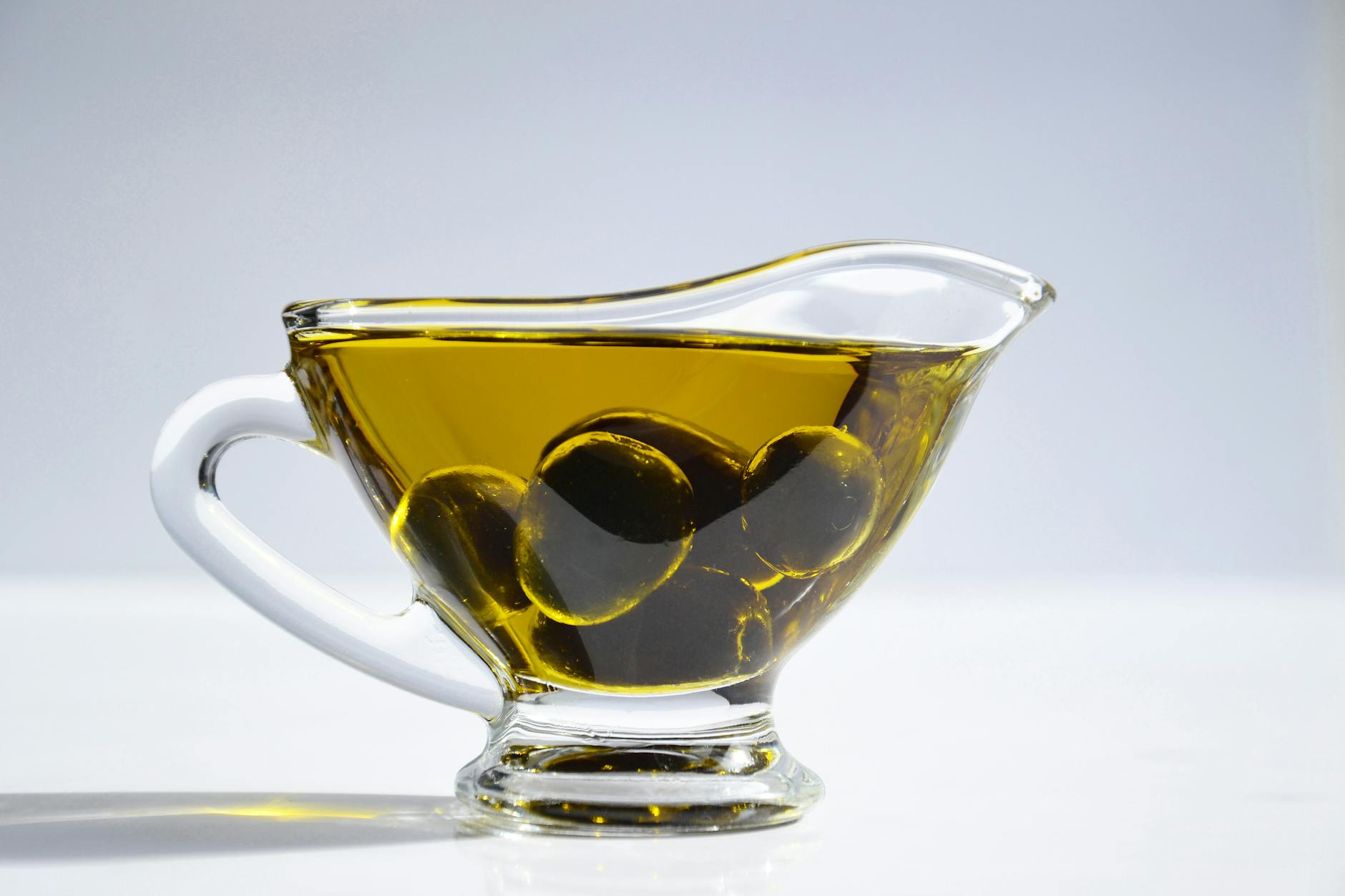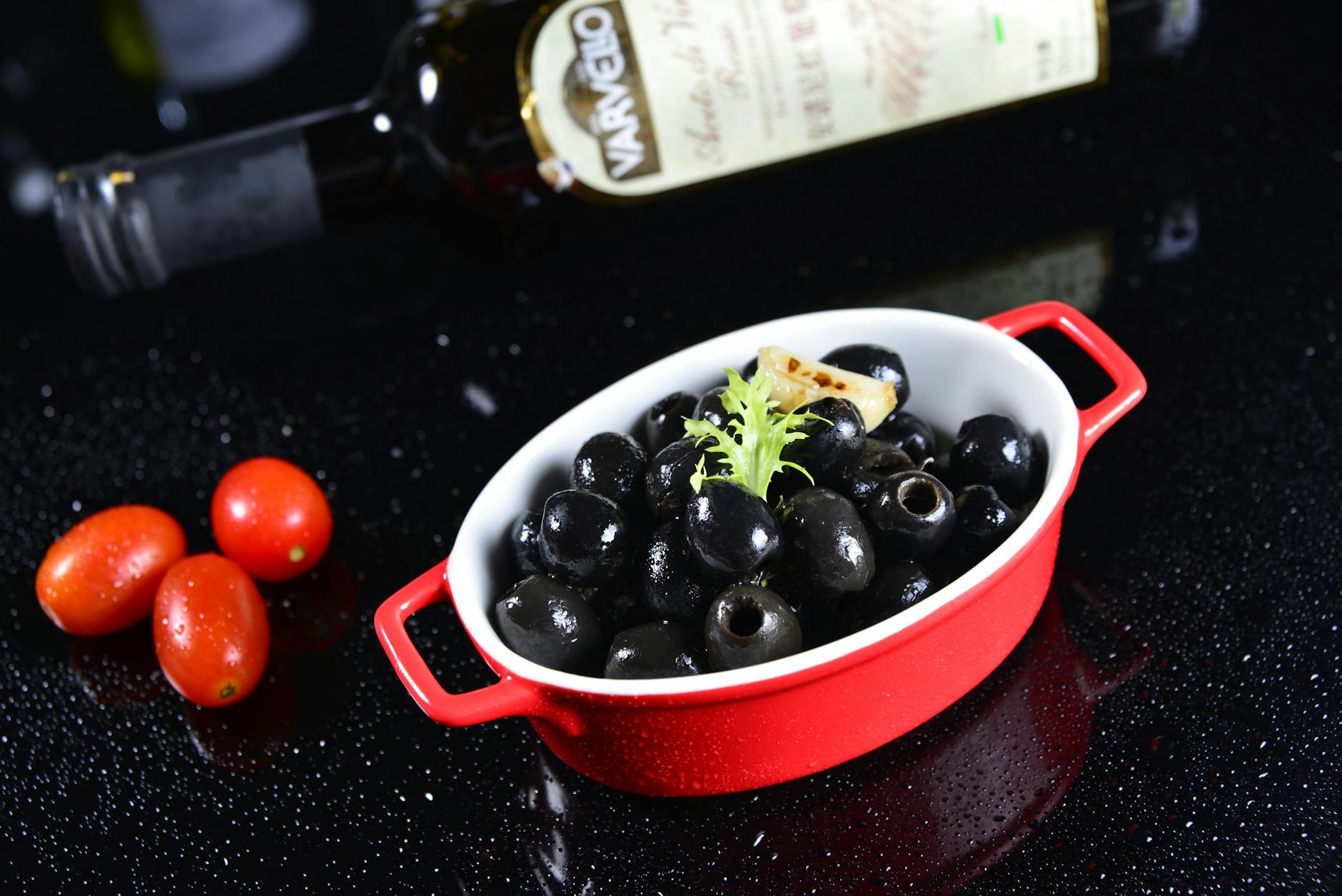
Have you ever stopped to consider the humble olive? 🫒 These small, unassuming fruits pack a powerful punch when it comes to your health. From heart health to brain function, olives offer a treasure trove of benefits that might surprise you.
Struggling with inflammation, digestive issues, or weight management? Olives could be the secret weapon you’ve been overlooking. Not only are they delicious additions to salads and appetizers, but they’re also nutritional powerhouses that can support your overall well-being. In this blog post, we’ll dive into the incredible health benefits of olives, exploring everything from their heart-protective properties to their potential for enhancing your skin’s radiance.
Ready to discover how these tiny fruits can make a big impact on your health? Let’s explore the seven key ways olives can boost your wellness, starting with their impressive nutritional profile and moving through their effects on various aspects of your health.

Table of Contents
Nutritional Profile of Olives
Olives are not just a tasty addition to your meals; they’re also packed with essential nutrients that contribute to overall health. Let’s dive into the nutritional powerhouse that olives represent.
A. Rich in healthy fats
Olives are renowned for their high content of monounsaturated fats, particularly oleic acid. These healthy fats are crucial for:
- Heart health
- Reducing inflammation
- Supporting brain function
B. Mineral content
Olives are an excellent source of various minerals, including:
| Mineral | Benefits |
|---|---|
| Iron | Supports red blood cell production |
| Calcium | Promotes bone health |
| Copper | Aids in collagen formation |
| Sodium | Helps maintain fluid balance |
C. Source of essential vitamins
These small fruits pack a punch when it comes to vitamins:
- Vitamin E: A powerful antioxidant
- Vitamin A: Essential for eye health and immune function
- Vitamin K: Crucial for blood clotting and bone metabolism
D. High in antioxidants
Olives are rich in antioxidants, which protect your cells from damage caused by free radicals. Key antioxidants include:
- Oleuropein
- Hydroxytyrosol
- Tyrosol
- Oleanolic acid
These compounds contribute to the olive’s anti-inflammatory and disease-fighting properties.
With this impressive nutritional profile, it’s no wonder olives offer numerous health benefits. Now, let’s explore how these nutrients specifically contribute to heart health.

Heart Health Benefits
Olives, a staple of the Mediterranean diet, offer remarkable benefits for cardiovascular health. Let’s explore how these little fruits can significantly impact your heart’s well-being.
Improving Arterial Health
Olives are rich in monounsaturated fats and antioxidants, which play a crucial role in maintaining healthy arteries. These compounds help:
- Reduce inflammation in blood vessels
- Prevent oxidation of LDL cholesterol
- Improve endothelial function
| Compound | Function |
|---|---|
| Oleic acid | Reduces inflammation |
| Hydroxytyrosol | Powerful antioxidant |
| Oleuropein | Protects LDL from oxidation |
Reducing Blood Pressure
The potassium content in olives contributes to blood pressure regulation. Here’s how olives help:
- Balancing sodium levels in the body
- Promoting vasodilation (widening of blood vessels)
- Supporting proper fluid balance
Lowering Cholesterol Levels
Olives contain compounds that actively work to improve your cholesterol profile:
- Increase HDL (good) cholesterol
- Decrease LDL (bad) cholesterol
- Reduce triglyceride levels
The combination of these heart-healthy properties makes olives an excellent addition to a cardiovascular-friendly diet. Regular consumption can contribute to overall heart health and potentially reduce the risk of heart disease.
Now that we’ve explored the heart health benefits of olives, let’s move on to their impressive anti-inflammatory properties.

Anti-inflammatory Properties
Olives are not just a delicious snack; they’re also a powerhouse of anti-inflammatory compounds that can significantly benefit your health. Let’s explore how these little fruits can help combat inflammation in your body.
Supporting overall joint health
Olives contain oleocanthal, a natural compound that acts similarly to ibuprofen in reducing inflammation. This property makes olives particularly beneficial for maintaining healthy joints. Regular consumption of olives or olive oil can:
- Reduce joint pain and stiffness
- Improve mobility
- Slow down cartilage degradation
Alleviating arthritis symptoms
For those suffering from arthritis, olives can be a game-changer. The anti-inflammatory effects of olives can help:
- Decrease joint swelling
- Reduce pain associated with arthritis
- Improve overall joint function
Here’s a comparison of the anti-inflammatory effects of olives versus common medications:
| Anti-inflammatory Agent | Effectiveness | Side Effects |
|---|---|---|
| Olives/Olive Oil | Moderate | Minimal |
| Ibuprofen | High | Moderate |
| Corticosteroids | Very High | Severe |
Combating chronic inflammation
Chronic inflammation is linked to various health issues, including heart disease, diabetes, and certain cancers. Olives can help combat this silent threat by:
- Neutralizing free radicals with their high antioxidant content
- Reducing inflammatory markers in the blood
- Supporting a balanced immune response
Incorporating olives into your diet is a simple yet effective way to harness their anti-inflammatory properties. Whether you enjoy them as a snack, in salads, or use olive oil in cooking, you’re taking a step towards better health and reduced inflammation.
Now that we’ve explored the anti-inflammatory benefits of olives, let’s move on to how they can support your digestive health.

Digestive Health Advantages
Olives not only tantalize our taste buds but also offer significant benefits for our digestive system. Let’s explore how these small fruits can contribute to a healthier gut.
Aiding in Digestion
Olives are rich in dietary fiber, which plays a crucial role in maintaining digestive health. The fiber content in olives helps:
- Promote regular bowel movements
- Prevent constipation
- Support overall gut motility
Additionally, olives contain compounds that stimulate the production of digestive enzymes, further enhancing the breakdown of food and nutrient absorption.
Potential Colon Cancer Prevention
Research suggests that olives may have protective effects against colon cancer. This potential benefit is attributed to:
- High levels of antioxidants, particularly phenolic compounds
- Anti-inflammatory properties that reduce cellular damage
| Compound | Function |
|---|---|
| Oleuropein | Potent antioxidant |
| Hydroxytyrosol | Reduces oxidative stress |
| Oleic acid | Supports cell membrane integrity |
These compounds work synergistically to create an environment less conducive to cancer cell growth in the colon.
Promoting Gut-Friendly Bacteria
Olives act as a prebiotic, nourishing beneficial gut bacteria. This prebiotic effect:
- Enhances the growth of probiotic organisms
- Improves the balance of gut microbiota
- Strengthens the gut’s immune function
By fostering a healthy gut microbiome, olives contribute to better digestion, improved nutrient absorption, and overall gastrointestinal wellness.
As we’ve seen, incorporating olives into your diet can significantly benefit your digestive health. Next, we’ll explore how these nutritious fruits can aid in weight management.

Weight Management Support
When it comes to managing your weight, olives can be a valuable addition to your diet. These small, flavorful fruits offer several benefits that can support your weight management goals.
Healthy Snack Alternative
Olives serve as an excellent alternative to high-calorie, processed snacks. Here’s why they’re a smart choice:
- Low in calories: A typical serving of olives (about 10 medium-sized olives) contains only 30-40 calories.
- Rich in healthy fats: Olives are packed with monounsaturated fats, which can help you feel satisfied and reduce overall calorie intake.
- Versatile: They can be eaten alone, added to salads, or used in various recipes for a flavor boost without excessive calories.
Boosting Metabolism
Olives contain compounds that may help boost your metabolism:
- Oleic acid: This monounsaturated fatty acid can increase fat oxidation and energy expenditure.
- Polyphenols: These antioxidants in olives may help improve metabolic function.
| Compound | Benefit |
|---|---|
| Oleic acid | Increases fat oxidation |
| Polyphenols | Improves metabolic function |
Promoting Feelings of Fullness
Olives can help you feel fuller for longer, which is crucial for weight management:
- High fiber content: Olives contain dietary fiber, which slows digestion and promotes satiety.
- Healthy fats: The monounsaturated fats in olives can help reduce appetite and cravings.
- Flavor satisfaction: The rich, savory taste of olives can help satisfy cravings for salty or fatty foods with fewer calories.
By incorporating olives into your diet, you can enjoy a tasty, nutritious food that supports your weight management efforts. Next, we’ll explore how olives can benefit your skin and enhance your natural beauty.

Skin and Beauty Benefits
The health benefits of olives extend beyond internal well-being, offering significant advantages for your skin, hair, and nails. Let’s explore how these nutrient-rich fruits can enhance your natural beauty.
A. Supporting nail strength
Olives are packed with essential nutrients that contribute to stronger, healthier nails:
- Vitamin E: Protects nail cells from oxidative damage
- Iron: Promotes nail growth and prevents brittleness
- Fatty acids: Moisturize and nourish the nail bed
B. Promoting hair health
The nutritional profile of olives makes them an excellent food for maintaining lustrous locks:
| Nutrient | Benefit for Hair |
|---|---|
| Vitamin E | Improves scalp circulation |
| Copper | Prevents premature graying |
| Omega-3 fatty acids | Reduces hair breakage |
C. Protecting against UV damage
Olives contain powerful antioxidants that help shield your skin from harmful UV rays:
- Hydroxytyrosol: A potent antioxidant that neutralizes free radicals
- Oleuropein: Reduces skin damage caused by UV exposure
- Squalene: Acts as a natural sunscreen, absorbing UV radiation
D. Enhancing skin elasticity
The unique combination of nutrients in olives contributes to firmer, more youthful-looking skin:
- Vitamin E: Promotes collagen production
- Oleic acid: Keeps skin soft and supple
- Polyphenols: Fight oxidative stress, reducing the appearance of fine lines and wrinkles
Incorporating olives into your diet can provide these skin and beauty benefits, supporting a radiant complexion from the inside out. Next, we’ll explore how olives can positively impact brain health and cognitive function.

Brain Health and Cognitive Function
Olives, a staple of the Mediterranean diet, offer remarkable benefits for brain health and cognitive function. Let’s explore how these small fruits can enhance your mental acuity and potentially protect against age-related cognitive decline.
Enhancing Focus and Concentration
Olives are rich in polyphenols, particularly hydroxytyrosol, which has been shown to improve attention span and concentration. These powerful antioxidants help protect brain cells from oxidative stress, allowing for better neural communication and improved focus.
- Benefits of olives for focus:
- Reduce mental fatigue
- Increase alertness
- Improve reaction time
Improving Memory
The monounsaturated fats in olives, particularly oleic acid, play a crucial role in supporting brain health and memory function. These healthy fats contribute to the formation and maintenance of myelin, the protective sheath around nerve fibers that facilitates quick and efficient transmission of information between brain cells.
| Nutrient | Role in Memory |
|---|---|
| Oleic Acid | Supports myelin formation |
| Vitamin E | Protects brain cells from oxidative damage |
| Polyphenols | Enhance synaptic plasticity |
Potential Alzheimer’s Prevention
Emerging research suggests that the compounds found in olives may have neuroprotective properties that could help prevent or slow the progression of Alzheimer’s disease. The anti-inflammatory and antioxidant effects of olive polyphenols may reduce the accumulation of beta-amyloid plaques, a hallmark of Alzheimer’s.
- Potential mechanisms for Alzheimer’s prevention:
- Reduction of oxidative stress
- Inhibition of neuroinflammation
- Promotion of neuroplasticity
As we’ve seen, incorporating olives into your diet can provide significant benefits for brain health and cognitive function. Next, we’ll explore how olives can contribute to overall skin health and beauty, offering yet another reason to embrace this nutritious Mediterranean fruit.
Olives are a nutritional powerhouse, offering a wide array of health benefits that extend far beyond their delicious taste. From supporting heart health and reducing inflammation to aiding digestion and promoting weight management, these small fruits pack a powerful punch. Their positive impact on skin health, cognitive function, and overall well-being make them a valuable addition to any diet.
Incorporating olives into your daily meals is a simple yet effective way to boost your health. Whether enjoyed on their own, added to salads, or used in cooking, olives provide a flavorful and nutritious option for those seeking to improve their overall health. Make olives a staple in your kitchen and reap the rewards of their numerous health-promoting properties.
